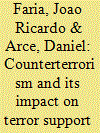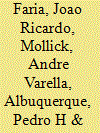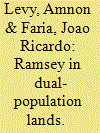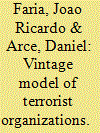| Srl | Item |
| 1 |
ID:
153063


|
|
|
|
|
| Summary/Abstract |
The Portuguese economist Carlos Pestana Barros died on 19 February 2017. He was 63 years old. Carlos spent his career as a researcher and teacher at ISEG of University of Lisbon. Carlos was an indefatigable academic that actively promoted academic cooperation. He organized conferences and journal special issues contributing to the field by networking authors, disseminating new models, data, and empirical methods. He was a member of the Editorial Board of Defence and Peace Economics and of several other journals.
|
|
|
|
|
|
|
|
|
|
|
|
|
|
|
|
| 2 |
ID:
116231


|
|
|
|
|
| Publication |
2012.
|
| Summary/Abstract |
This article presents a dynamic model in which counterterrorism policies have the potential to generate positive public support for terrorism via a backlash that may fuel terror recruitment. For an optimizing government aiming at maximizing security, this phenomenon produces a natural bound on proactive counterterror policy that is related to the dynamic path of conflict. Moreover, terror is a persistent phenomenon that requires patience on the part of the target government for optimal counterterror policies to be realized. Finally, the potential for backlash yields insights into the need for target governments to fight an information war to change public opinion regarding its own policies and the ultimate effect of terror attacks.
|
|
|
|
|
|
|
|
|
|
|
|
|
|
|
|
| 3 |
ID:
092549


|
|
|
|
|
| Publication |
2009.
|
| Summary/Abstract |
The increase in oil prices in recent years has occurred concurrently with a rapid expansion of Chinese exports in the world markets, despite China being an oil importing country. In this paper we develop a theoretical model that explains the positive correlation between Chinese exports and the oil price. The model shows that Chinese growth can lead to an increase in oil prices that has a stronger impact on its export competitors. This is due to the large labor force surplus of China. We then examine this hypothesis by estimating a reduced form equation for Chinese exports using Rodrik [Rodrik, Dani, 2006. What's so special about China's exports? China and World Economy 14, 1-19.]'s measure of export competitiveness, together with the oil price, productivity, real exchange rate, and foreign industrial production over the monthly 1992-2005 period. The results suggest a stable relationship and yields slightly positive values for the price of oil and elastic coefficients for export competitiveness, along with the expected negative elasticity for the real exchange rate.
|
|
|
|
|
|
|
|
|
|
|
|
|
|
|
|
| 4 |
ID:
110007


|
|
|
|
|
| Publication |
2011.
|
| Summary/Abstract |
This article introduces integro-differential equations as a new technique to study terrorism dynamics. An integro-differential equation is a mathematical expression that contains derivatives of the required function and its integral transforms. The technique is applied to two different dynamic models in terrorism: terrorism and tourism, and terrorist innovations. In the first model the number of tourists that appears in an integral term and also in a derivative term is impacted by the number of terrorists. In the second model the integro-differential equation for terrorist innovations relates them to terrorist attacks. The article shows how to solve, analyze, interpret, and deal with integro-differential equations. Integro-differential equations shed light on aspects of the models ignored when other techniques are used. This is particularly important for the evaluation of current counterterrorist policies, as well as to the formulation of new ones.
|
|
|
|
|
|
|
|
|
|
|
|
|
|
|
|
| 5 |
ID:
078234


|
|
|
|
|
| Publication |
2007.
|
| Summary/Abstract |
Ramsey's model is extended to three possible scenarios of conflicts in dual-population lands: partition, federation and civil war. The federally utility-maximizing consumption-growth rate in a strictly political federation might be lower than that under partition for the wealthier and more slowly multiplying group. This group may benefit from joining a federation that facilitates technological transfer and from obeying the federal no-arbitrage rule as long as its own technology is inferior to the hybrid. The utility-maximizing consumption growth rate for a group engaged in a civil war is larger than those under partition and a strictly political federation if its rival's warfare is mainly aimed at inflicting casualties and is likely to be smaller when its rival's warfare is mainly sabotage
|
|
|
|
|
|
|
|
|
|
|
|
|
|
|
|
| 6 |
ID:
068302


|
|
|
| 7 |
ID:
113949


|
|
|
|
|
| Publication |
2012.
|
| Summary/Abstract |
A dynamic model of a terrorist organization is presented with the defining feature being that a succession of operatives is recruited at different points in time. Consequently, a government's counterterror policy must be tailored according to the vintage structure of the terrorist group that it faces. This implies that past history of counterterror policy and attacks matter for the formulation of current and future policy. The authors present the necessary steps to formulate and solve a vintage model, and to deal with the delay differential equations that naturally arise from the vintage structure. The resulting analysis captures the implications of a diverse set of phenomena such as Internet recruiting, training delays for logistically complex plots, age distribution of operatives, and the sensitivity of government impatience/cabinet composition to terrorist events for the inner dynamics of terrorist organizations and counterterror policy. Directions for future research are also suggested.
|
|
|
|
|
|
|
|
|
|
|
|
|
|
|
|